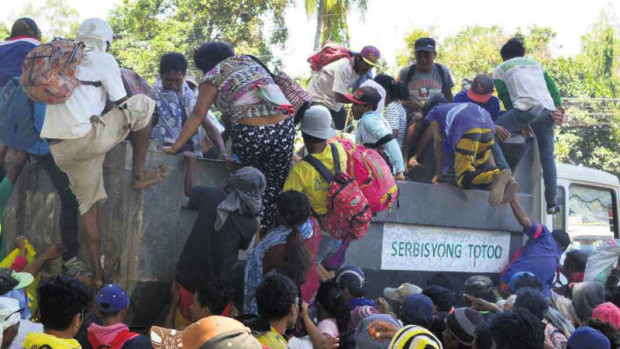
GOING HOME Some 200 farmers among those dispersed during a rally of drought-affected peasants in Kidapawan City to demand government aid, climb onto a truck that will take them home on Sunday, April 3.. WILLIAMOR A. MAGBANUA / INQUIRER MINDANAO
CAMP VICENTE LIM, Laguna—There was no order to disperse the protesting farmers in Kidapawan City, North Cotabato province, on April 1, only an explicit instruction for police to clear the highway blocked by the protesters, Director General Ricardo Marquez, Philippine National Police chief, said on Friday.
Marquez also said he did not know who gave the order to fire a warning shot that triggered the melee which led to the deaths of three farmers and the wounding of more than 100 other people, including policemen.
Some 6,000 farmers whose farms had been ravaged by an El Niño-related drought had been picketing the National Food Authority office in Kidapawan for three days when riot police used water cannons to break their barricade on April 1.
The farmers stood their ground and shots were fired, setting off a clash between the protesters and the policemen.
Three farmers were shot dead while 116 others were injured.
The PNP reported that 40 of its men were injured in the clash, two seriously.
At the Senate inquiry into the incident held in Davao City on Thursday, the regional police director, Chief Supt. Noel Armilla, said Marquez closely monitored the events in Kidapawan.
How much does he know?
Asked by reporters here how much he knew about the situation, Marquez said he had been receiving information from Armilla by text message since March 30.
“When the mass of people assembled on the highway, I received text messages from the regional director. I think that was March 30. We were scheduled to have a command conference the following day in Davao and I happened to be on a plane seated near (North Cotabato) Gov. (Emmylou Taliño)-Mendoza,” Marquez said.
READ: North Cotabato governor: Police made call to disperse farmers in Kidapawan City
The messages, he said, referred to people starting to block the highway, forcing authorities to reroute traffic.
Marquez said there was an alternative route, but it was only for light vehicles.
He said trucks could not pass through the highway because it was blocked by the protesters.
Marquez was here on Friday for the inauguration of a renovated multipurpose hall named after him and for the presentation of illegal firearms seized by the police in the Calabarzon (Cavite, Laguna, Batangas, Rizal and Quezon) region.
Whose orders?
On April 1, the day of the violence, Marquez said he was informed that a crisis management committee had been formed to deal with the farmers’ protest.
“It was the decision of the crisis management committee not to disperse—there was [no order to disperse] … but to clear the highway so that, you know, it could be used by people, by commuters,” he said.
He said there was no order to fire at the protesters.
“I don’t think there was [an] instruction to fire except, probably, when the two police officers … were being clubbed,” he said.
Pressed on who gave the order to shoot, Marquez said: “I really don’t know who gave the order, but indeed a [shot was fired].”
At the Senate inquiry in Davao on Thursday, the North Cotabato provincial police director, Supt. Alexander Tagum, denied giving the order.
Mendoza told the hearing that she did not give the order to disperse the farmers.
READ: PNP chief on Kidapawan incident: No order to disperse
Tagum said Armilla gave the order to clear the highway.
Armilla confirmed that he ordered Tagum to clear the highway.
But in an interview with the Inquirer, Armilla said the decision to disperse the protesters was “Tagum’s and Tagum’s alone.”
Tagum has been relieved to clear the way for a PNP investigation of the violence.
Marquez said he had attended one meeting with President Aquino since the incident.
The President wanted to see the report of the police investigation of the incident, he said.
Mr. Aquino spoke about the incident for the first time on Friday at a campaign rally of his administration’s candidates in next month’s elections in Makati City.
Meeting with P-Noy
The President, however, only referred to the incident in speaking about the difficult life of a President.
He did not say anything about the accusations of militant groups and his critics that his administration’s slow response to the El Niño-related drought was to blame for the farmers’ protest that turned violent.
Mr. Aquino also did not say anything about his administration’s response to the drought.
READ: CBCP leader: Aquino’s silence on Kidapawan incident shows apathy
The President, however, has called the Department of the Interior and Local Government, PNP, Department of Social Welfare and Development, and other agencies to a meeting for a discussion of what happened in Kidapawan and the power outage at Ninoy Aquino International Airport last weekend. With a report from Nikko Dizon in Manila
RELATED STORIES
Duterte curses N. Cotabato’s Mendoza on ‘politicizing’ Kidapawan incident
Duterte vows to aid Kidapawan farmers
Binay camp: Kidapawan farmers asking for rice, not bullets